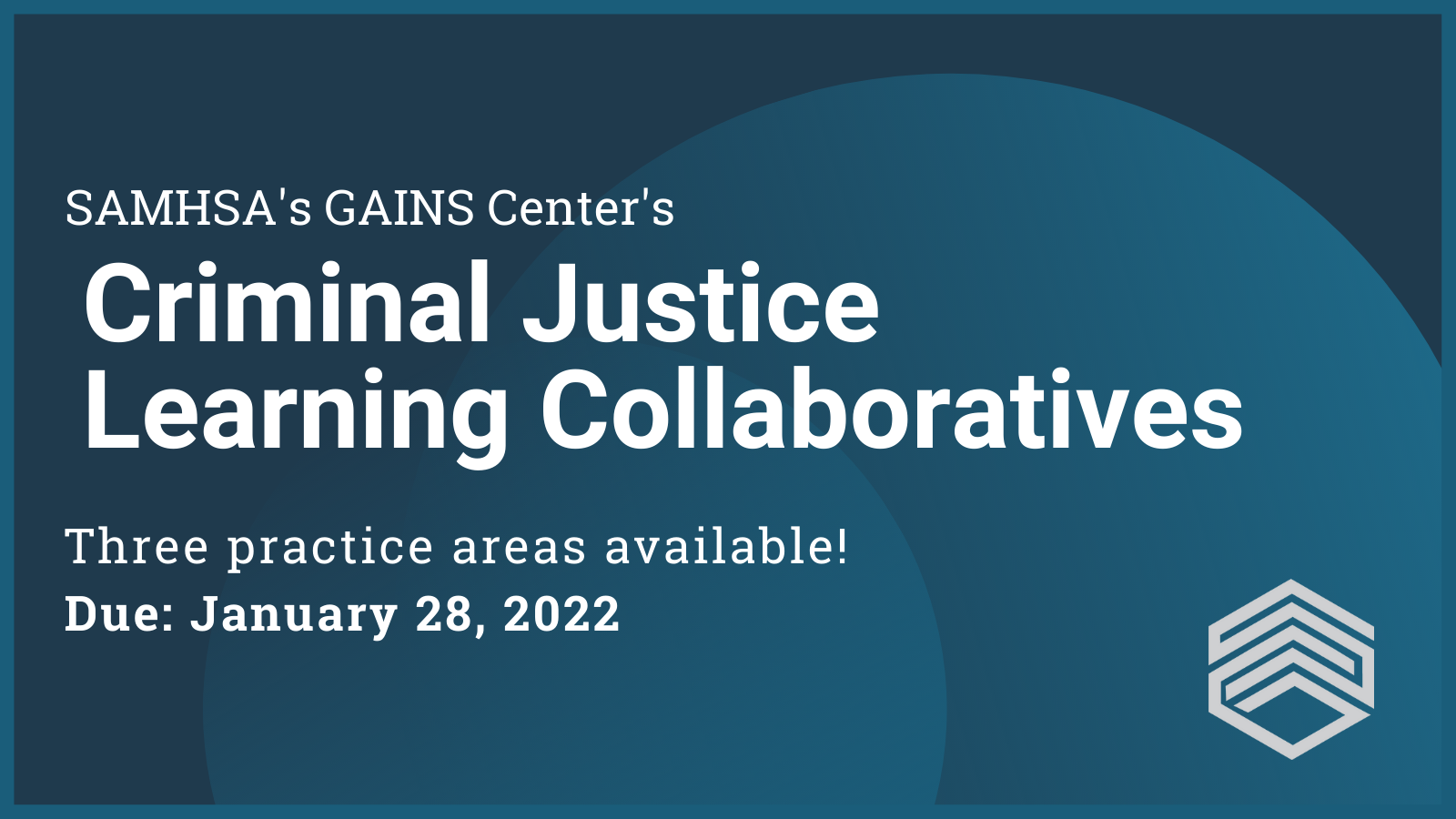SAMHSA’s GAINS Center for Behavioral Health and Justice Transformation, operated by Policy Research Associates, Inc., is continuing to provide direct training and technical assistance to jurisdictions across the nation to better support people with behavioral health needs who are involved in the criminal justice system. The GAINS Center solicited applications from jurisdictions interested in collaborating with subject-matter experts through Criminal Justice Learning Collaboratives (LCs) designed to explore three topics:
- Integrating Civilian-Led, Co-response, and Specialized Police Response Models
- Equity and Inclusion in Drug Treatment Courts
- Transition Reentry Strategies
For updates on future opportunities, join the GAINS Center mailing list.
About the Criminal Justice LCs
The Learning Collaborative model brings together local jurisdiction teams to create coordinated local strategic plans and implementation strategies for the focus topic. Selected teams for each LC will work intensively to determine optimal ways to implement best practices and define success indicators for their respective LC. Each topic-specific LC will engage subject-matter experts to work with jurisdiction teams during the implementation process and facilitate peer-to-peer sharing. Through a virtual platform, selected teams will work together to learn and complete their implementation work while at the same time having the opportunity to share with other jurisdictions and receive an array of technical assistance from subject-matter experts across the country.
The Learning Collaboratives are designed to achieve four key objectives:
- Enhance collective knowledge of key issues and familiarity with the topic
- Understand promising, best, and evidence-based practices to address the topic and related issues
- Develop strategic plans that focus on the issue, including defining assignments, deadlines, and measurable outcomes to be reported
- Increase knowledge about the challenges and lessons learned in implementing strategies through peer-to-peer sharing via virtual convenings, monthly collaborative calls, and other virtual mechanisms
Application and Selection Process
- Applications for these solicitations are due January 28, 2022
- General requirements:
- Narrative (up to five pages)
- Expectations/guidelines will differ by LC topic
- List of key stakeholders who will participate in the team
- Letters of support or commitment from key partners
- Selected jurisdictions will be notified on or about February 14, 2022
FY2022 LCs
Integrating Civilian-Led, Co-response and Specialized Police Response Models
The Integrating Civilian-Led, Co-response, and Specialized Police Response Models LC will help communities reduce police involvement in mental health crisis response and seamlessly integrate police response strategies. With 911-988 integration, crisis care continuum expansion opportunities from the American Rescue Plan, the SAMHSA Block Grant crisis services set aside, and reframing police initiatives, communities will have new opportunities to improve responses to individuals requiring a crisis response. Broadly framed, crisis response systems require someone to talk to, someone to respond, and somewhere to go. This LC will focus on the second component, “someone to respond.” Through participation in this LC, selected sites will work to improve strategies related to the expansion of civilian-based mobile response, integration of co-response and police specialized response, effective triage of crisis calls, and engagement of community partners to provide accessible and timely treatment options.
Equity and Inclusion in Drug Treatment Courts
The Equity and Inclusion in Drug Treatment Courts LC will provide participating treatment courts a structured and guided process to learn about and implement core strategies outlined in the National Association of Drug Court Professionals’ Equity and Inclusion: Equivalent Access Assessment and Toolkit. Participating treatment court teams will create and implement strategies to reduce racial and ethnic disparities in access to and participation in treatment court programs. As part of this LC, participating treatment court teams will engage in a data-driven process to accomplish the following:
- Understanding who is and who should be accessing program services
- Identifying opportunities and barriers to access and participation in treatment court programming
- Developing and implementing strategies to improve access among underserved groups
Transition Reentry Strategies
The primary goal of the Transition Reentry Strategies LC is for teams to develop community-wide strategic plans to advance policies and practices around a continuum of processes that provide seamless transition and retention in the community. These processes include housing approaches, employment skills and services, and peer-based recovery services to support individuals returning from jails and prisons in their recovery. Given the impact of bail reform and reduction in jail incarceration due to the pandemic, reentry will be considered broadly and incorporate post-booking diversion strategies that accelerate release from incarceration.
Informational Webinars
To learn more about this opportunity and to gain insight into preparing a strong LC application, please download the informational webinar slides and Q&A document.


